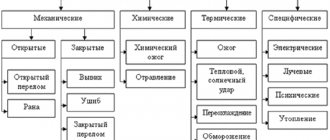Federal Law No. 255-FZ “On Compulsory Social Insurance...” establishes the circle of persons who must be insured in the event of temporary disability. This legislative act introduces the requirement of compulsory insurance coverage.
Dear readers! The article talks about typical ways to resolve legal issues, but each case is individual. If you want to find out how to solve your particular problem , contact a consultant:
+7 (499) 938-81-90 (Moscow)
+7 (812) 467-32-77 (Saint Petersburg)
8 (800) 301-79-36 (Regions)
APPLICATIONS AND CALLS ARE ACCEPTED 24/7 and 7 days a week.
It's fast and FREE !
This document regulates the procedure and possible amounts of benefits that are assigned in the event of a temporary period of incapacity for work associated with pregnancy and subsequent childbirth.
The requirements that must be met during the assignment of social insurance benefits are also discussed.
Specifics of action
Law 255-FZ defines:
- Types of material support.
- Responsibilities and legal capabilities of legal entities.
- Dimensions, procedure, conditions for providing material support.
The normative act “On compulsory social insurance in case of temporary disability and in connection with maternity” does not apply to relations regarding cash transfers to citizens who are unable to perform professional tasks due to work-related injuries or occupational diseases. There are a number of exceptions to this rule. They are determined by the provisions of Articles 12-15 of the act in question to the extent that does not contradict Federal Law No. 125.
Federal Law of December 29, 2006 No. 255-FZ
RUSSIAN FEDERATION
THE FEDERAL LAW
On compulsory social insurance in case of temporary disability and in connection with maternity
(Name as amended by Federal Law dated July 24, 2009 No. 213-FZ)
Adopted by the State Duma on December 20, 2006
Approved by the Federation Council on December 27, 2006
(As amended by federal laws dated 02/09/2009 No. 13-FZ, dated 07/24/2009 No. 213-FZ, dated 09/28/2010 No. 243-FZ, dated 12/08/2010 No. 343-FZ, dated 02/25/2011 No. 21-FZ, dated 01.07.2011 No. 169-FZ, dated 28.11.2011 No. 339-FZ, dated 03.12.2011 No. 379-FZ, dated 29.12.2012 No. 276-FZ, dated 05.04.2013 No. 36-FZ, dated 02.07.2013 No. 185-FZ, dated July 23, 2013 No. 243-FZ, dated November 25, 2013 No. 317-FZ, dated April 2, 2014 No. 59-FZ, dated June 28, 2014 No. 188-FZ, dated June 28, 2014 No. 192-FZ, dated 07/21/2014 No. 216-FZ, dated 12/01/2014 No. 406-FZ, dated 12/01/2014 No. 407-FZ, dated 12/31/2014 No. 495-FZ, dated 12/29/2015 No. 394-FZ, dated 03/09/2016 No. 55 -FZ, dated 07/03/2016 No. 250-FZ, dated 05/01/2017 No. 86-FZ, dated 03/07/2018 No. 56-FZ, dated 06/27/2018 No. 164-FZ, dated 12/27/2018 No. 536-FZ, dated 01.10 .2019 No. 328-FZ, dated December 27, 2019 No. 486-FZ, dated June 8, 2020 No. 166-FZ, dated June 8, 2020 No. 175-FZ, dated December 8, 2020 No. 429-FZ, dated December 29, 2020 No. 478- Federal Law, dated 04/30/2021 No. 126-FZ, dated 05/26/2021 No. 151-FZ)
Chapter 1. General provisions
Article 1. Subject of regulation of this Federal Law
1. This Federal Law regulates legal relations in the system of compulsory social insurance in case of temporary disability and in connection with maternity, determines the circle of persons subject to compulsory social insurance in case of temporary disability and in connection with maternity, and the types of compulsory insurance coverage provided to them, establishes the rights and responsibilities of subjects of compulsory social insurance in case of temporary disability and in connection with maternity, and also determines the conditions, amounts and procedure for providing benefits for temporary disability, pregnancy and childbirth, monthly child care benefits for citizens subject to compulsory social insurance in case of temporary disability and in connection with maternity. (As amended by Federal Law No. 213-FZ dated July 24, 2009)
2. This Federal Law does not apply to relations related to the provision of citizens with benefits for temporary disability in connection with an industrial accident or occupational disease, with the exception of the provisions of Articles 8, 9, 12, 13, 14 and 15 of this Federal Law applicable to the specified relations in the part that does not contradict the Federal Law of July 24, 1998 No. 125-FZ “On compulsory social insurance against accidents at work and occupational diseases.” (As amended by Federal Law No. 36-FZ dated 04/05/2013)
Article 11. Legislation of the Russian Federation on compulsory social insurance in case of temporary disability and in connection with maternity
1. The legislation of the Russian Federation on compulsory social insurance in case of temporary disability and in connection with maternity is based on the Constitution of the Russian Federation and consists of this Federal Law, Federal Law of July 16, 1999 No. 165-FZ “On the Fundamentals of Compulsory Social Insurance”, others federal laws. Relations related to compulsory social insurance in case of temporary disability and in connection with maternity are also regulated by other regulatory legal acts of the Russian Federation. (As amended by federal laws dated December 8, 2010 No. 343-FZ; dated December 29, 2012 No. 276-FZ; dated July 3, 2016 No. 250-FZ)
11. Legal relations related to control over the correctness of calculation, completeness and timely payment of insurance contributions for compulsory social insurance in case of temporary disability and in connection with maternity to the Social Insurance Fund of the Russian Federation are regulated by the legislation of the Russian Federation on taxes and fees. (Part introduced - Federal Law dated July 3, 2016 No. 250-FZ)
2. In cases where an international treaty of the Russian Federation establishes rules other than those provided for by this Federal Law, the rules of the international treaty of the Russian Federation apply.
21. Decisions of interstate bodies adopted on the basis of the provisions of international treaties of the Russian Federation in their interpretation, contrary to the Constitution of the Russian Federation, are not subject to execution in the Russian Federation. Such a contradiction may be established in the manner prescribed by federal constitutional law. (Part introduced - Federal Law No. 429-FZ dated 08.12.2020)
3. For the purpose of uniform application of this Federal Law, if necessary, appropriate clarifications may be issued in the manner determined by the Government of the Russian Federation.
(Article introduced - Federal Law dated July 24, 2009 No. 213-FZ)
Article 12. Basic concepts used in this Federal Law
1. For the purposes of this Federal Law, the following basic concepts are used:
1) compulsory social insurance in case of temporary disability and in connection with maternity - a system of legal, economic and organizational measures created by the state aimed at compensating citizens for lost earnings (payments, rewards) or additional expenses in connection with the occurrence of an insured event under compulsory social insurance for case of temporary disability and in connection with maternity;
2) an insured event under compulsory social insurance in case of temporary disability and in connection with maternity - an accomplished event, upon the occurrence of which the insurer becomes obligated, and in some cases established by this Federal Law, the insured to provide insurance coverage;
3) compulsory insurance coverage for compulsory social insurance in case of temporary disability and in connection with maternity (hereinafter also referred to as insurance coverage) - fulfillment by the insurer, and in some cases established by this Federal Law, by the insured of its obligations to the insured person upon the occurrence of an insured event through payment of benefits established by this Federal Law;
4) funds of compulsory social insurance in case of temporary disability and in connection with maternity - funds generated by the payment of insurance premiums by policyholders for compulsory social insurance in case of temporary disability and in connection with maternity, as well as property under the operational management of the insurer;
5) insurance contributions for compulsory social insurance in case of temporary disability and in connection with maternity (hereinafter referred to as insurance premiums) - mandatory payments made by insurers to the Social Insurance Fund of the Russian Federation in order to ensure compulsory social insurance of insured persons in case of temporary disability and in connection with motherhood;
6) average earnings - the average amount of wages, other payments and remunerations paid by the policyholder to the insured person in the billing period, on the basis of which, in accordance with this Federal Law, temporary disability benefits, maternity benefits, and monthly child care benefits are calculated , and for persons who voluntarily entered into legal relations under compulsory social insurance in case of temporary disability and in connection with maternity - the minimum wage established by federal law on the day of the insured event.
2. Other concepts and terms used in this Federal Law are used in the meaning in which they are used in other legislative acts of the Russian Federation.
(Article introduced - Federal Law dated July 24, 2009 No. 213-FZ)
Article 13. Insurance risks and insured events
1. Insurance risks for compulsory social insurance in case of temporary disability and in connection with maternity are recognized as temporary loss of earnings or other payments, remuneration by the insured person in connection with the occurrence of an insured event or additional expenses of the insured person or members of his family in connection with the occurrence of an insured event.
2. The following are recognized as insured events for compulsory social insurance in case of temporary disability and in connection with maternity:
1) temporary disability of the insured person due to illness or injury (with the exception of temporary disability due to industrial accidents and occupational diseases) and in other cases provided for in Article 5 of this Federal Law;
2) pregnancy and childbirth;
3) birth of a child (children);
4) caring for a child until he reaches the age of one and a half years;
5) death of the insured person or a minor member of his family.
(Article introduced - Federal Law dated July 24, 2009 No. 213-FZ)
Article 14. Types of insurance coverage
1. Types of insurance coverage for compulsory social insurance in case of temporary disability and in connection with maternity are the following payments:
1) temporary disability benefit;
2) maternity benefits;
3) (Clause has lost force - Federal Law dated May 26, 2021 No. 151-FZ)
4) one-time benefit for the birth of a child;
5) monthly child care allowance;
6) social benefit for funeral.
2. The conditions, amounts and procedure for payment of insurance coverage for compulsory social insurance in case of temporary disability and in connection with maternity are determined by this Federal Law, Federal Law of May 19, 1995 No. 81-FZ “On State Benefits for Citizens with Children” (hereinafter — Federal Law “On State Benefits for Citizens with Children”), Federal Law of January 12, 1996 No. 8-FZ “On Burial and Funeral Business” (hereinafter referred to as the Federal Law “On Burial and Funeral Business”).
(Article introduced - Federal Law dated July 24, 2009 No. 213-FZ)
Article 2. Persons subject to compulsory social insurance in case of temporary disability and in connection with maternity
1. Citizens of the Russian Federation, foreign citizens and stateless persons permanently or temporarily residing in the territory of the Russian Federation, as well as foreign citizens and stateless persons temporarily residing in the Russian Federation (for with the exception of highly qualified specialists in accordance with Federal Law dated July 25, 2002 No. 115-FZ “On the legal status of foreign citizens in the Russian Federation”): (As amended by Federal Law dated December 1, 2014 No. 407-FZ)
1) persons working under employment contracts, including heads of organizations who are the only participants (founders), members of organizations, owners of their property; (As amended by Federal Law dated December 3, 2011 No. 379-FZ)
2) state civil servants, municipal employees;
3) persons holding government positions in the Russian Federation, government positions in a constituent entity of the Russian Federation, as well as municipal positions filled on a permanent basis;
4) members of a production cooperative who take personal labor participation in its activities;
5) clergy;
6) persons sentenced to imprisonment and involved in paid work.
2. Persons subject to compulsory social insurance in case of temporary disability and in connection with maternity in accordance with this Federal Law are insured persons.
3. Lawyers, individual entrepreneurs, members of peasant (farm) households, individuals not recognized as individual entrepreneurs (notaries engaged in private practice, other persons engaged in private practice in accordance with the legislation of the Russian Federation), members of family (tribal) communities of indigenous minorities peoples of the North, Siberia and the Far East of the Russian Federation are subject to compulsory social insurance in case of temporary disability and in connection with maternity if they voluntarily entered into a relationship under compulsory social insurance in case of temporary disability and in connection with maternity and pay insurance premiums for themselves in accordance with Article 45 of this Federal Law. (As amended by Federal Law No. 164-FZ dated June 27, 2018)
4. Insured persons have the right to receive insurance coverage subject to the conditions provided for by this Federal Law, as well as the Federal Law “On State Benefits for Citizens with Children” and the Federal Law “On Burial and Funeral Business”. Persons who voluntarily entered into a relationship under compulsory social insurance in case of temporary disability and in connection with maternity acquire the right to receive insurance coverage subject to payment of insurance premiums during the period determined by Article 45 of this Federal Law.
41. Foreign citizens and stateless persons temporarily staying in the Russian Federation (with the exception of highly qualified specialists in accordance with Federal Law No. 115-FZ of July 25, 2002 “On the legal status of foreign citizens in the Russian Federation”) have the right to receive insurance provision in the form of temporary disability benefits, subject to payment of insurance premiums for them by the policyholders specified in Part 1 of Article 21 of this Federal Law for a period of at least six months preceding the month in which the insured event occurred. (Part introduced - Federal Law dated December 1, 2014 No. 407-FZ)
5. For the purposes of this Federal Law, persons working under employment contracts are persons who have concluded an employment contract in the prescribed manner from the day on which they were supposed to start work, as well as persons actually admitted to work in accordance with labor legislation.
6. Legislative and regulatory legal acts of the Russian Federation and constituent entities of the Russian Federation may establish other payments to provide for federal state civil servants, state civil servants of constituent entities of the Russian Federation in case of temporary disability and in connection with maternity, financed accordingly from the federal budget, budgets subjects of the Russian Federation.
(Article as amended by Federal Law dated July 24, 2009 No. 213-FZ)
Article 21. Policyholders
1. Insurers for compulsory social insurance in case of temporary disability and in connection with maternity are persons who make payments to individuals subject to compulsory social insurance in case of temporary disability and in connection with maternity in accordance with this Federal Law, including:
1) organizations - legal entities formed in accordance with the legislation of the Russian Federation, as well as foreign legal entities, companies and other corporate entities with civil legal capacity, created in accordance with the legislation of foreign states, international organizations, branches and representative offices of these foreign entities and international organizations created on the territory of the Russian Federation;
2) individual entrepreneurs, including heads of peasant (farm) farms;
3) individuals who are not recognized as individual entrepreneurs.
2. For the purposes of this Federal Law, lawyers, individual entrepreneurs, members of peasant (farm) households, individuals who are not recognized as individual entrepreneurs (notaries engaged in private practice, other persons engaged in private practice in accordance with the procedure established by the legislation of the Russian Federation), are treated as insured persons. members of family (tribal) communities of indigenous peoples of the North, Siberia and the Far East of the Russian Federation, who voluntarily entered into relations under compulsory social insurance in case of temporary disability and in connection with maternity in accordance with Article 45 of this Federal Law. These persons exercise the rights and bear the obligations of policyholders provided for by this Federal Law, with the exception of the rights and obligations associated with the payment of insurance coverage to the insured persons. (As amended by Federal Law No. 164-FZ dated June 27, 2018)
3. If the policyholder simultaneously belongs to several categories of policyholders specified in parts 1 and 2 of this article, the calculation and payment of insurance premiums are made by him on each basis.
(Article introduced - Federal Law dated July 24, 2009 No. 213-FZ)
Article 22. Insurer
1. Compulsory social insurance in case of temporary disability and in connection with maternity is carried out by the insurer, which is the Social Insurance Fund of the Russian Federation.
2. The Social Insurance Fund of the Russian Federation and its territorial bodies constitute a single centralized system of bodies for managing compulsory social insurance funds in the event of temporary disability and in connection with maternity.
3. The legal status and procedure for organizing the activities of the Social Insurance Fund of the Russian Federation are determined by federal law.
(Article introduced - Federal Law dated July 24, 2009 No. 213-FZ)
Article 23. Registration and deregistration of policyholders
1. Registration and deregistration of policyholders is carried out in the territorial bodies of the insurer: (As amended by Federal Law No. 250-FZ dated 07/03/2016)
1) insurers - legal entities simultaneously with their registration (deregistration) as insurers for compulsory social insurance against accidents at work and occupational diseases in accordance with the Federal Law of July 24, 1998 No. 125-FZ “On compulsory social insurance against accidents at work and occupational diseases" on the basis of information submitted to the insurer by the federal executive body carrying out state registration of legal entities, contained in the unified state register of legal entities and presented in accordance with the legislation of the Russian Federation; (As amended by Federal Law No. 486-FZ dated December 27, 2019)
2) insurers - legal entities at the location of their separate divisions, for which, in order to carry out transactions, legal entities have opened bank accounts in credit institutions and who accrue payments and other rewards in favor of individuals, simultaneously with their registration (deregistration) as insurers under compulsory social insurance against industrial accidents and occupational diseases in accordance with the Federal Law of July 24, 1998 No. 125-FZ “On compulsory social insurance against industrial accidents and occupational diseases” on the basis of documents available to the insurer; (As amended by Federal Law dated July 3, 2016 No. 250-FZ)
3) insurers - individuals who have entered into an employment contract with an employee, at the place of residence of these individuals simultaneously with their registration
Subject of regulation
The normative act “On compulsory social insurance in case of temporary disability and in connection with maternity” defines situations in which subjects can count on material support. The document first defines risk. It is called a temporary loss of earnings or other income or remuneration by a citizen due to the occurrence of an insured event. Risks also include the costs incurred by the subject or his relatives if they are unable to perform their professional tasks in accordance with the job description.
Are annual remunerations under Article 255 of the Tax Code of the Russian Federation included in taxable expenses?
Consider the following situation.
Gloria LLC plans to provide annual rewards. What should be the company's action algorithm?
1. In accordance with paragraph 1 of Art. 324.1 of the Tax Code of the Russian Federation, Gloria LLC must establish in a document such as an accounting policy an equal method of reserving for the payment of annual remuneration, set a limit on such a reserve and the subsequent percentage of monthly deductions. To do this, an estimate is drawn up, in which the size of the annual reserve is determined, based on the ratio of the annual payroll and the percentage deduction from it to the reserve for the annual remuneration. Next, the annual reserve is broken down monthly (in the monthly amounts it is also necessary to take into account payments for insurance premiums in the amount of the annual remuneration).
Let's say that Gloria LLC has planned that labor costs in 2021 will be 7,000,000 rubles, and the percentage of reservation for annual remuneration will be 10% of them. At the same time, the amount of insurance premiums (including contributions for “injuries”) is 30.2%. This means that the estimated annual reserve limit for annual remuneration will be: 7,000,000 × 1,302 × 10% = RUB 911,400.
ATTENTION! From April 1, 2020, the organization has the right to apply reduced insurance premium rates. See here for details.
2. At the second stage, a reserve is directly formed in a monthly format for the annual remuneration. To do this, the amount of labor costs and accrued insurance premiums should be multiplied by the established monthly percentage of contributions to the reserve. The received reserve amounts should be taken into account in expenses for income tax in accordance with clause 24 of Art. 255 Tax Code of the Russian Federation.
IMPORTANT! The amount of the reserve accumulated during the year using the calculation method should not exceed the limit that was specified in the accounting policy.
Please note: compliance with the reserve limit for annual remuneration should be monitored by year. Let’s say that from January to December 2021, Gloria LLC’s labor costs amounted to 6,890,000 rubles. This means that during this period a reserve was formed: 6,890,000 × 1,302 × 10% = 897,078 rubles. That is, in December the reserve will be formed in the amount of: 911,400 – 897,078 = 14,322 rubles, so as not to exceed the limit.
3. An inventory of the annual remuneration reserve should be made at 31 December 2021. This means that you need to compare the amount of the formed reserve for the year with the amount of remuneration accrued to employees, taking into account insurance premiums, and identify any shortfalls or overruns.
When is financial support due?
Payment of temporary disability benefits is made when:
- Inability to carry out work activities due to injury or illness. The exception is the receipt of an industrial injury or occupational disease, as well as other circumstances defined by Article 5 of the normative act in question.
- Pregnancy and childbirth.
- Caring for minors up to 1.5 years old.
- Birth of children (child).
- Death of the subject or minor family member.
Types of collateral
These include payments:
- Women who registered with medical institutions in the early stages of pregnancy.
- At the birth of a child. This financial assistance is provided one time.
- For pregnancy/childbirth.
- Child care. This assistance is provided monthly for 1.5 years.
- Due to temporary inability to perform professional tasks.
- For burial.
The size, conditions, and procedure for providing security are established by regulations No. 81 of May 19, 1995, No. 8 of January 12. 1996, as well as Federal Law 255-FZ.
Subjects of law
Law 255-FZ applies to:
- Persons performing professional duties in accordance with the contract.
- State civil, municipal employees.
- Members of production cooperatives, if they personally participate in their activities.
- Clergymen.
- Persons sentenced to prison and assigned to paid work.
- Subjects holding government positions at the federal and regional levels, as well as holding municipal posts on a permanent basis.
To which reporting period should “carrying over” vacation pay be attributed (clause 7 of Article 255 of the Tax Code of the Russian Federation)?
Let's look at an example.
Manager Ivankov S.S., who works at , is going on vacation from 06/29/2020 to 07/26/2020. As it should be according to the norms of the Labor Code of the Russian Federation, vacation pay was paid until the employee went on vacation on June 25, 2020 in the amount of 25,000 rubles. The frequency of filing profit declarations at Clarisa LLC is quarterly. This means that 2 days of vacation pay fall in the 2nd quarter of 2021, and 26 days in the 3rd quarter. That turns out to be 26 days of “rolling over” vacation pay. To what period for profit taxation should they be classified?
In accordance with paragraph 7 of Art. 255 of the Tax Code of the Russian Federation, labor costs taken into account in the tax base include vacation pay payments in the form of average earnings. This means that vacation pay in the amount of 25,000 rubles. Ivankova S.S. should be provided for when calculating the base as part of expenses. But in what period to take them into account, the letter of the Federal Tax Service dated 03/06/15 No. 7-3-04/ [email protected]
According to these explanations, expenses in the amount of 25,000 rubles. must be taken into account during the period of their formation and payment, i.e. in the profit tax return for the 2nd quarter of 2021. According to the fiscal authority, there is no need to divide vacation pay, although the Ministry of Finance of the Russian Federation has a different opinion.
We recommend that you read the material “On the eve of summer, the Ministry of Finance spoke about how to take into account “rolling” vacations for profit .
Changes
Let's consider some provisions of 255-FZ in the new edition of 2021. Adjustments to the regulatory act have been made several times. The changes, in particular, affected the procedure for calculating the amount of payments for child care, labor and labor, as well as for temporary disability. The rules are established by Article 14 of the normative act in question. In 2016, amendments were introduced by Federal Law No. 213 of July 24, 2009. This article determines that the average citizen’s earnings are used in calculating amounts. It, in turn, is established for 2 years (calendar) that preceded the period of incapacity for work, leave associated with prenatal and childbirth, as well as child care. The period includes all periods of professional activity, even if it was carried out at other enterprises.
What changes have been made
Since 03/07/2018, there has been a need to place information on assigned and paid benefits in the created unified state information system for social security.
We are talking about those benefits that were assigned and paid by the territorial body of the Social Insurance Fund in the case where the policyholder himself has completed his activities, or bankruptcy proceedings are underway, or there is no source for such payment.
Read 173 Federal Law on currency regulation and currency control. What's new in Federal Law 229 on enforcement proceedings? See here.
Do you need Federal Law 44 on procurement? Click go.
A comment
Federal Law 255 provides these rules only for situations in which a subject of law, who has worked in different organizations during the previous two years, receives security at one enterprise. If he is paid amounts in each institution in which he is a member of the state, the average earnings are not taken into account. If in both or one of two calendar years the citizen was on maternity or maternity leave, the corresponding periods can be replaced for calculation, provided that this operation will lead to an increase in the amount of security. To do this, the interested person writes a written statement.
Results
This article examined a number of topical issues regarding labor costs for tax purposes. The main conclusion arising from the presented materials is that many payments in favor of employees can be justified and taken into account under the article “Wages” as participating in taxation.
It is very important to correctly process such payments and pay special attention to documents such as labor and collective agreements, as well as other local acts of the organization. Remember that even if the norms of Art. 255 of the Tax Code of the Russian Federation allows expenses to be included in labor costs, it is worth carefully studying the conditions under which this will be legal and justified.
Sources: Tax Code of the Russian Federation
You can find more complete information on the topic in ConsultantPlus. Free trial access to the system for 2 days.
Average salary calculation
255-FZ, as amended in 2021, establishes that earnings include all amounts transferred in favor of a citizen. At the same time, they must make contributions to the Social Insurance Fund, the Federal Compulsory Medical Insurance Fund, and the Pension Fund. Amounts sent to these funds before December 31 are taken into account. 2016 When determining average earnings, deductions established by the Tax Code may also be taken into account. The latest provision comes into force on January 1. 2021 The scheme for calculating earnings is as follows. The amount of accrued salary for the amount established in part one of Article 14 is divided by the number of calendar days in it. In this case, days that belong to the following periods are excluded from the calculation:
- Temporary incapacity for work, stay on parental leave, BiR.
- Release of an employee from professional activities with partial/full retention of earnings. At the same time, contributions to the funds should not be accrued for the specified amounts during this time.
Maternity benefit calculator
First of all, it should be said that until 2013, 2 calculation methods were used. Currently, the amount is determined in one way. The following data is entered into the maternity benefit calculator:
- Vacation period. It depends on the number of children and the presence/absence of complications. 140 days are set for a singleton, problem-free pregnancy, 156 for a problematic pregnancy and 194 for a multiple pregnancy.
- Earnings for 2 years. As mentioned above, this period consists of the years preceding the period of leave. In this case, the date of sick leave is important, not the date of birth. Only a full year can be taken into account – from January 1 to December 31. The full amount of earnings is taken, without deduction of personal income tax.
- Settlement days. Their number is 730 or 731 (depending on whether it is a leap year or not). From the number of days should be subtracted: the period of illness, leave for employment or child care, as well as the period of release from professional duties with preservation of salary and without deduction of contributions to funds.
One point should be noted here. No other periods can reduce the number of settlement days. So, if a woman worked directly for only 1 year over the course of 2 years, and was unemployed the rest of the time, the number 730 (731) will be used to determine the amount.
Providing temporary disability benefits
The right to leave on sick leave is exercised:
- in case of loss of ability to work due to illness or injury;
- when caring for a sick relative;
- during a prosthetic procedure carried out according to the indications of a medical institution;
- when continuing treatment in sanatorium and resort organizations for medical reasons.
When these cases occur, benefits are assigned and paid only if the insured person is officially employed.
Payment of funds under sick leave is made for the entire period of incapacity for work, with the following exceptions:
- disabled people who have the appropriate certificate are paid sick leave for no more than 4 months in a row or a total of five months per year. This exception does not apply to tuberculosis;
- to an insured person who has an employment contract for a period of less than six months, payment is made only for 75 calendar days, no more.
The benefit amount comes directly from the official insurance period and is calculated as a percentage of average earnings in the following order:
- eight years and above – one hundred percent;
- from five to eight years – eighty percent;
- up to five years – sixty percent.
Article 8 of Federal Law No. 255-FZ describes the grounds that reduce the amount of benefit payments:
- violation of the regimen prescribed by the attending doctor;
- failure to appear on time for a medical examination on the appointed day;
- the onset of a disease or injury that occurs while intoxicated - alcohol, drugs or toxic.
For pregnancy and childbirth
According to general rules:
- the issuance of a sick leave certificate is carried out by the medical organization in which the pregnant woman is registered upon reaching 30 weeks of the obstetric period (28 weeks if there are two or more fetuses);
- payment of this benefit is a certain guarantor of social security and support for the insured woman.
Accrual and payment of sick leave for pregnancy and childbirth is carried out at a time, for the entire period, in the amount of one hundred percent of the average earnings received during the two years before the year of sick leave.
If the insurance period of a pregnant woman is up to 6 months, the payment is calculated according to the minimum wage.
Duration of maternity leave (measured in calendar days):
- during pregnancy with one fetus - 140 days (70 before, the same after childbirth);
- during pregnancy with two or more fetuses – 194 days (84 before, 110 after birth);
- in case of complications arising during labor - 16 days, are issued by obstetric institutions as a separate sick leave, which is a continuation of the primary sick leave;
- when adopting one or more children under three months of age - from the date of adoption and within 70 days, two or more - 110 days from the date of birth.
Calculation formulas
Law 255-FZ establishes the following calculation rules. To determine the amount of daily support in case of loss of the opportunity to perform professional duties, the BiR average earnings are multiplied by the coefficient established by Art. 7 and 11.2. The following formula is used to calculate the monthly amount. When determining it, it is necessary to calculate the average amount of earnings. It is calculated by multiplying the daily payment by 30.4. It, in turn, is determined according to the rules of Article 14 (parts 3.1 and 3.2). The amount of monthly child care payment is calculated by multiplying average earnings by a coefficient in accordance with Art. 11.2.
Rates
Law 255-FZ establishes the coefficients in Art. 7 and 11.2. Calculation of amounts in case of loss of the ability to perform professional tasks due to injury or illness is carried out using interest rates from average earnings. They are established depending on the duration of the insurance period:
- 8 years or more – 100%.
- 5-8 years – 80%.
- Up to 5 years – 60%.
The exception is situations where the injury or illness occurred within a month from the date of termination of the employment relationship. In these cases, a rate of 60% of the average salary is used.
Is it possible to include the payment of an anniversary bonus as an expense?
One more example.
One of the employees, engineer T.R. Krusov, turns 50 years old. In connection with the anniversary, the management decided to pay him a bonus for the anniversary. Is it possible to take such a payment into account as part of the taxable labor costs under Art. 255 of the Tax Code of the Russian Federation?
According to Art. 255 of the Tax Code of the Russian Federation, expenses include bonus payments that are directly related to the employee’s labor obligations and work activities. The anniversary is in no way connected with the employee’s fulfillment of his labor powers (obligations).
In Art. 252 of the Tax Code of the Russian Federation clearly states that only bonus payments for production results, achievement of target indicators and excellent work can be associated with labor obligations. An anniversary does not fit any of these formulations. Therefore, the anniversary bonus cannot be classified as a labor cost for income tax purposes.
Monthly provision
Child care benefits are accrued at 40% of average earnings. In this case, the amount of the resulting amount should not be lower than that established by regulations for persons with children. When caring for two or more minors over 1.5 years of age, the amount of support is summed up. Moreover, its value cannot be more than 100% of the average citizen’s earnings established in accordance with Art. 14. When calculating monthly amounts for the second and subsequent children, previous minors, including adopted ones, are taken into account. The exception is cases when in relation to the latter the mother is deprived of parental rights.
Sick leave
It is a document of strict reporting, which represents the right of the insured person to receive benefits in case of illness.
The sick leave form was approved by order of the Ministry of Health and Social Development of Russia dated June 29, 2011 No. 624n, has a unified form and established procedures for filling it out.
Since 05/01/2017, on the basis of Federal Law No. 86-FZ, innovations have been introduced regarding the possibility of issuing sick leave in the form of an electronic document, but only at the request of the insured person expressed in writing.
This form practically eliminates errors and does not require verification of the document’s authenticity. In the event that violations are made when filling out sick leave that contradict the filling out regulations, the Social Insurance Fund has the right to refuse to reimburse the policyholder for expenses incurred.
Over the years of its work, Federal Law No. 255-FZ has undergone a significant number of significant changes to fulfill its goal of providing a guarantee of payment in cases of temporary disability among insured persons.








